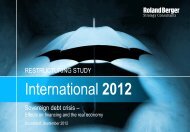issue 1 - Roland Berger
issue 1 - Roland Berger
issue 1 - Roland Berger
You also want an ePaper? Increase the reach of your titles
YUMPU automatically turns print PDFs into web optimized ePapers that Google loves.
Interview DOSSIER #01<br />
»The stability pact will not be<br />
undermined. It is not to be viewed<br />
as merely a list of invalidating<br />
circumstances. It is and remains<br />
the EU directive.«<br />
merous attractive markets in these new EU states,<br />
such as communications and mobility.<br />
In other words, you’re saying that highly skilled<br />
workers and consumers with purchasing power have<br />
been added.<br />
That’s right, and even the biggest skeptics have by<br />
now noticed this. For example, Polish farmers, who<br />
for a long time had been against the idea of EU membership,<br />
have benefited most from this move. This<br />
has become evident within a mere six months. Naturally,<br />
there are tremendous differences among the<br />
potential growth dynamics of the individual countries.<br />
But wasn’t that also the case in the early<br />
stages of the European Community and European<br />
Union? Just think of Ireland.<br />
High on the agenda at the Lisbon summit in the<br />
spring of 2000 was economic, social and environmental<br />
reform of the EU by 2010. The main goals<br />
were economic growth, full employment and sustainable<br />
development. Four years later, in April 2004,<br />
Romano Prodi, the predecessor of the European<br />
Commission’s current president, José Barroso, criticized<br />
the EU member states for failing to take on the<br />
responsibility required to achieve these goals. An indication<br />
of this failure is that hundreds of thousands<br />
of people in the eurozone lost their jobs in 2003.<br />
Still, there is no reason to throw out the directionsetting<br />
ideas of Lisbon simply on account of inaction,<br />
for which member states have rightly been reprimanded.<br />
The Lisbon agenda clearly indicates<br />
which factors have a key impact on national structures.<br />
These are the factors we must increasingly<br />
focus on following enlargement. In the first instance,<br />
we must increase our investments in education and<br />
knowledge acquisition. It will be crucial also to expand<br />
networks, raise the competitiveness of industry<br />
and the service sector, and reform health care<br />
systems in accordance with the demographic structures<br />
of member states. After all, what is the EU? It is<br />
the realization of the idea of partnership between<br />
governments, employers, workers, trade unions and<br />
other associations. They are all involved in transnational<br />
governance, and their challenge is to structure<br />
it in a way that benefits all members.<br />
Are the 10 new EU member states facing tasks similar<br />
to those of the 15 countries of the old European<br />
Union?<br />
They certainly are. The structural challenges the<br />
new members have to come to grips with are those<br />
the old member states themselves had to master<br />
when they were the newcomers. The member states<br />
have to implement a macroeconomic policy oriented<br />
toward growth and stability while pressing ahead<br />
with economic reforms aimed at boosting growth<br />
across Europe. In addition, they have to improve sustainability.<br />
In the economic sphere this means making<br />
adjustments in line with the aging of their<br />
populations; for social policy it means creating and<br />
preserving jobs; and in terms of ecology, from a<br />
European perspective, it primarily means investing<br />
in the transportation and energy sectors.<br />
And what are the major differences between these<br />
two groups of member states?<br />
For one thing, the unemployment rates and budget<br />
deficits of the new members are about twice as high<br />
as those of the EU-15. Also, the per capita income of<br />
the people living in those countries is less than onehalf<br />
the income of their counterparts in the old member<br />
states. However, even as we look at these<br />
figures, I should warn against thinking only in terms<br />
of the arithmetic average. If we compare the new<br />
member states with one another directly, we see<br />
considerable differences among their rates of inflation,<br />
unemployment figures, hourly wages, education<br />
levels, consumer behavior, health care systems<br />
and many other parameters.<br />
Can the new member states deal with all these<br />
challenges without outside help?<br />
The answer to that question differs depending on<br />
which country you’re looking at. We must be very<br />
careful not to underestimate the challenges. That’s<br />
why country-specific recommendations must take<br />
into account the respective country’s particular circumstances.<br />
For example, we may in some cases<br />
have to extend the adjustment period. If so, however,<br />
we must always be mindful of the fact that our<br />
ultimate goal is the sustainable stabilization of the<br />
European Union as a whole.<br />
The new member states are now subject—as indeed<br />
the old ones are—to strict monitoring of their economic<br />
and budgetary policies. This includes an<br />
assessment of their fiscal situation. We already<br />
know that Cyprus, the Czech Republic, Hungary,<br />
Malta, Poland and Slovakia have all failed to cap<br />
their fiscal deficits at 3 percent of GDP, and that<br />
Cyprus and Malta each has a national debt that<br />
exceeds 60 percent of GDP. What conclusions has the<br />
Commission drawn from this state of affairs?<br />
Well, it is not immediately going to start monitoring<br />
their fiscal policies more closely or imposing sanctions.<br />
These measures will be applicable only once<br />
these countries have been incorporated into the<br />
eurozone. This differentiates them from Greece and<br />
the other countries that have already introduced the<br />
euro as their currency. However, this approach does<br />
not mean that we are not carefully studying the<br />
medium-term budgetary plans of the new member<br />
states, or that we are turning our back entirely on<br />
making recommendations. After all, these member<br />
states are to be incorporated into the eurozone in the<br />
foreseeable future. We shall therefore be indicating<br />
to them at a later date how they might gradually set<br />
about eliminating their budget deficits and fulfilling<br />
the convergence criteria. The case of Greece has<br />
shown that we must proceed in a truly thorough and<br />
transparent manner if we wish to avoid the unhinging<br />
of the EU as a whole. Insecurity in no way constitutes<br />
a basis for healthy growth across the new<br />
European Union.<br />
Hans Eichel, Germany’s finance minister, estimates<br />
that his country’s deficit in 2004 will again exceed 3<br />
percent—its second violation of the stability pact in a<br />
row. The European Commission has communicated<br />
its understanding both for Germany and for France,<br />
which also has a deficit in excess of the limit. This<br />
attitude might be very welcome to certain finance<br />
ministers. Financial authorities such as Edgar<br />
Meister, a board member of the German Bundesbank,<br />
and Jean-Claude Trichet, president of the European<br />
Central Bank, on the other hand, take the<br />
contrary position and are indeed extremely worried<br />
about this. They view this policy of understanding as<br />
a danger to the euro.<br />
think: act 35
















